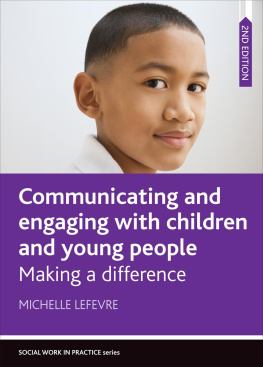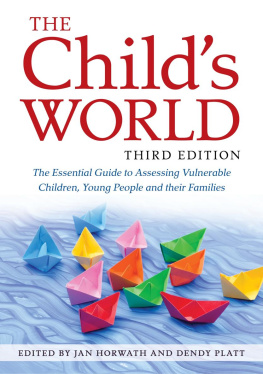
First published in Great Britain in 2018 by
Policy Press University of Bristol 1-9 Old Park Hill Bristol BS2 8BB UK Tel +44 (0)117 954 5940 e-mail
North American office: Policy Press c/o The University of Chicago Press 1427 East 60th Street Chicago, IL 60637, USA t: +1 773 702 7700 f: +1 773-702-9756 e:
Policy Press 2018
British Library Cataloguing in Publication Data
A catalogue record for this book is available from the British Library.
Library of Congress Cataloging-in-Publication Data
A catalog record for this book has been requested.
ISBN 978-1-4473-4353-0 paperback
ISBN 978-1-4473-4356-1 ePdf
ISBN 978-1-4473-4354-7 ePub
ISBN 978-1-4473-4355-4 Mobi
The right of Michelle Lefevre to be identified as author of this work has been asserted by her in accordance with the Copyright, Designs and Patents Act 1988.
All rights reserved: no part of this publication may be reproduced, stored in a retrieval system, or transmitted in any form or by any means, electronic, mechanical, photocopying, recording, or otherwise without the prior permission of Policy Press.
The statements and opinions contained within this publication are solely those of the authors and not of the University of Bristol, Policy Press or the British Association of Social Workers. The University of Bristol, Policy Press and the British Association of Social Workers disclaim responsibility for any injury to persons or property resulting from any material published in this publication.
Policy Press works to counter discrimination on grounds of gender, race, disability, age and sexuality.
Cover design by Policy Press
Front cover: image kindly supplied by istock
Readers Guide
This book has been optimised for PDA.
Tables may have been presented to accommodate this devices limitations.
Image presentation is limited by this devices limitations.
Series editors: Viviene Cree , University of Edinburgh and Steve Myers , University of Salford
This important series sets new standards in introducing social workers to the ideas, values and knowledge base necessary for professional practice. These core texts are designed for students undertaking professional training at all levels as well as fulfilling the needs of qualified staff seeking to update their skills or move into new areas of practice.
Published titles in the series
Social work - Viv Cree
Social work and multi-agency working - Kate Morris
Youth justice in practice - Bill Whyte
Radical social work in practice - Iain Ferguson and Rona Woodward
Religion, belief and social work - Sheila Furness and Philip Gilligan
Communicating with children and young people - Michelle Lefevre
Social work and lesbian, gay, bisexual and trans people - Julie Fish
Supporting people with alcohol and drug problems - Sarah Galvani
Social work in the community - Barbra Teater and Mark Baldwin
Residential child care in practice - Mark Smith, Leon Fulcher and Peter Doran
Effective writing for social work - Lucy Rai
Practice research partnerships in social work - Christa Fouch
Social work and people with learning difficulties - Susan Hunter and Denis Rowley
Social work with sex offenders - Malcolm Cowburn
Contents
A number of people have assisted me in completing the first and second editions of this book by helping me to formulate ideas and providing support. I am grateful to them all, but especially want to thank the many individuals who have shared with me not only their dilemmas and challenges in professional engagement and communication, but also their strategies, warmth and enthusiasm for their direct work. I have benefited hugely from the work of other researchers and theorists, and want particularly to thank Gillian Ruch, Karen Winter, Kristine Hickle, Barry Luckock, Nigel Thomas, Harry Ferguson, Elaine Sharland and Chris Hall for their support, encouragement and illuminating conversations. Particular respect and gratitude is owed to the children and young people I have worked with in practice and research over the years who have patiently allowed me to learn how best to engage and communicate with them. Finally I want to thank my wife, Claire Lucius, who has been unflaggingly supportive and encouraging throughout the development of both editions.
Setting the scene
Introduction
The importance of mutual engagement and communication between children, young people and their social workers can no longer be ignored. It is now clear that, if they are to understand them and make a real difference to their lives, practitioners must be able to relate to children and young people, listen to them, support them and fully involve them in matters that concern them. Indeed this can be a matter of life and death. Inquiries into the abuse, neglect, and non-accidental deaths of children and young people reveal time and time again how risks to them may be increased if professionals charged with their care and protection do not spend time getting to know them, finding out what they think and feel, and trying to make sense of their experiences (Ofsted, 2011; Sidebotham et al, 2016).
Numerous research studies report how professionals engagement with children and young people and the extent to which they are able to facilitate their participation make a significant difference to the quality of assessments, planning and service provision. Children and young people want to be actively included when decisions are being made about them. They also have a right to this, as set out in Article 12 of the United Nations Convention on the Rights of the Child: a right to express their views in all matters that affect them and for these views to be taken into account. As outlined in Chapter Two, this principle has now been enshrined in law, policy and practice guidance across services for children, young people and families in the UK (Thomas, 2015). So, finding out what young people are thinking, feeling, hoping and fearing, about wider service planning as well as decision making that affects them directly, is now a statutory requirement as well as a tenet of ethical practice. Involving young people in these ways makes practical good sense, too, as it draws on the insider expertise they have about their own lives (Braye and Preston-Shoot, 2005).
Certain groups of children and young people, such as those who are at risk of harm, those who require services to maintain and promote their welfare (including disabled children), those involved with judicial processes and those who are looked after, have specific entitlements to effective communication with social workers. As discussed in Chapter Three, many of these children and young people have been able to give a clear indication of what they want and expect from their social workers; for example, those in care have outlined their need and preference for information, consultation, support, reliability and a trusted interpersonal relationship (Jelicic et al, 2014).
And yet, despite these policy aspirations and clear practice guidelines, it is clear that even experienced social workers do not always feel confident in their skills and nor do they or their employers necessarily appreciate the importance of their direct work with children (Munro, 2011). Ethnographic research has shown how practitioners burdened by heavy caseloads and administrative demands in statutory contexts struggle to find the uninterrupted time and energy to create the trusting relationships within which children feel safe to explore and confide complex and sensitive matters (Broadhurst et al, 2010; Ferguson, 2016a; Winter et al, 2016). It is essential that resources to support practice, including adequate staffing and supervision that supports the emotional component of direct work, are made available to practitioners (Hingley-Jones and Ruch, 2016; Horwath, 2016). Standards of social work education and the availability of continuing professional development opportunities are also an important aspect of preparing practitioners for complex and contested conversations and interactions with children in challenging situations who may be frightened, distressed, traumatised, angry or confused.





